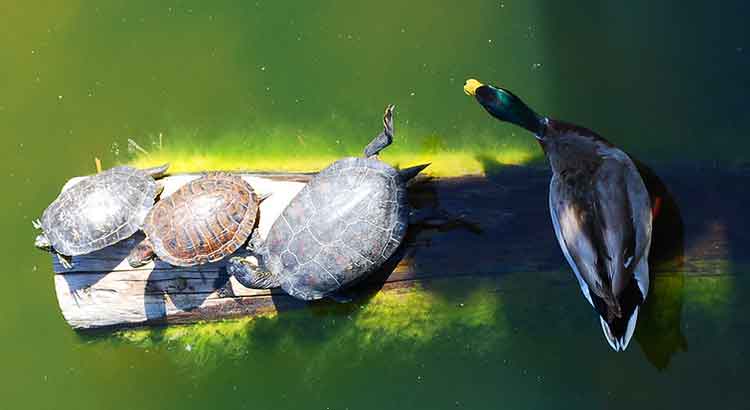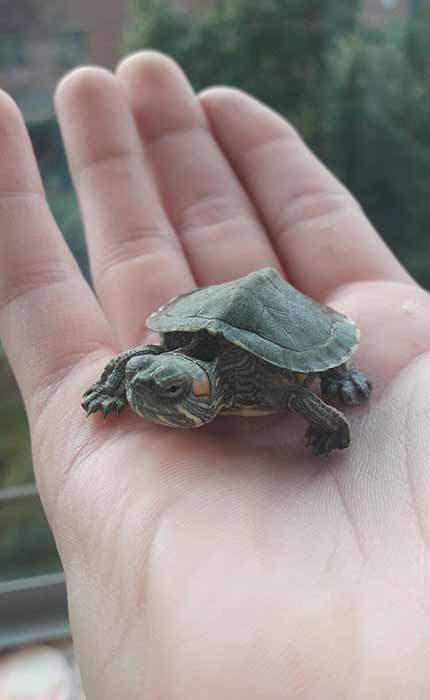Keeping pets is a rewarding and fulfilling experience, but it requires careful consideration and planning. If you are considering keeping ducks and turtles together, you may be wondering if this is a viable option. While these two species can coexist in the wild, there are several factors to consider before keeping them together in captivity.
Ducks do not typically eat turtles. Ducks may occasionally nibble on small aquatic creatures, such as tadpoles or snails, but they are not known to prey on turtles. While omnivores, ducks don’t consume too much meat, and their diet typically consists of plant material such as seeds, grains, and aquatic vegetation.
The only exception, are small baby turtles. Compared to adult turtles, baby turtles are defenceless, and it’s not uncommon to see a duck trying to eat one if the opportunity presents itself.
Can Ducks and Turtles Live Together?
It is not recommended to keep ducks and turtles together in the same enclosure. While ducks are unlikely to eat turtles, there are several reasons why keeping these animals together can be problematic.
Firstly, ducks are known to produce large quantities of waste, which can quickly accumulate and create unsanitary conditions for turtles. This can lead to health problems for both the ducks and turtles, as well as unpleasant odors and potentially harmful bacteria in the enclosure, or pond.
Secondly, ducks are highly active animals that enjoy splashing and playing in the water. This can create an environment that is stressful for turtles, who typically prefer a calm and stable water environment. Turtles may also become injured or stressed by the high activity levels of ducks, particularly if they are kept in a small enclosure, or a small pond.
While ducks are known to be territorial animals, the same is true for turtles, even if they don’t see at first. And depending on the mount of space available, they might end up fighting.
Finally, ducks and turtles have different dietary requirements and may compete for food resources. Ducks are primarily herbivores and require a diet of plant material and grains, while turtles are omnivores and require a diet that includes both plant and animal material. Feeding a mixed group of ducks and turtles can be challenging, as their dietary requirements are quite different.
While ducks and turtles may coexist peacefully in the wild, it is not recommended to keep them together in captivity. Providing separate enclosures and appropriate diets for each species is the best way to ensure their health and well-being.
Can A Turtle Eat A Duck?
It is highly unlikely that a turtle could eat a duck. Turtles are primarily herbivores or omnivores, and while some larger species may consume small animals such as fish or insects, they do not typically prey on birds.
Ducks, on the other hand, are not a natural prey item for turtles. Ducks are generally too large and too fast-moving for turtles to catch and consume. While turtles may occasionally scavenge on the remains of a dead bird, they are not known to actively hunt or prey on ducks.
It is worth noting that some species of turtles, such as snapping turtles, have powerful jaws and can deliver a serious bite if they feel threatened or cornered. However, this behavior is defensive rather than predatory and is unlikely to result in a turtle consuming a duck.
In general, ducks are more at risk from predators such as raccoons, foxes, and birds of prey than they are from turtles. While it is always important to provide appropriate housing and protection for all pets and livestock, it is unlikely that a turtle would pose a significant threat to a duck
Will the Ducks and Turtles Eat My Pond Fish?
Yes, both ducks and turtles are known to eat pond fish, and they can quickly decimate a pond’s fish population if left unchecked.
Ducks are omnivorous and will eat a variety of foods, including small fish, insects, and vegetation. While fish may not be their primary food source, ducks can easily spot and catch fish that are visible near the surface of the water.
Ducks are particularly attracted to fish that are brightly colored or have long, flowing fins, as these are easy to see and catch. They may also target smaller fish that are easier to swallow whole.
To prevent ducks from eating your pond fish, it is important to provide adequate protection for your fish. One option is to provide hiding places for the fish, such as submerged rocks, plants, or artificial fish shelters. These can help fish to escape from predators and provide a safe place to hide.
The same goes for turtles, the only difference is that turtles really love to eat fish, and they will probably spend most of their time trying to catch them.
Final Thoughts
While ducks and turtles can coexist peacefully in the wild, it is not recommended to keep them together in captivity. Providing separate enclosures with appropriate diets, space, and water quality is the best way to ensure the health and well-being of both species. If you are considering keeping ducks and turtles as pets, it is important to research the specific needs of each species and provide appropriate care to ensure their health and happiness.
I hope this article answered all of your questions about whether turtles and ducks can leave peaceful together, or if the ducks will try to eat your turtle. If you have any other questions regarding turtles, feel free to leave them in the comment section, my colleagues and I regularly check the comment section and answer all the questions that we can find.


